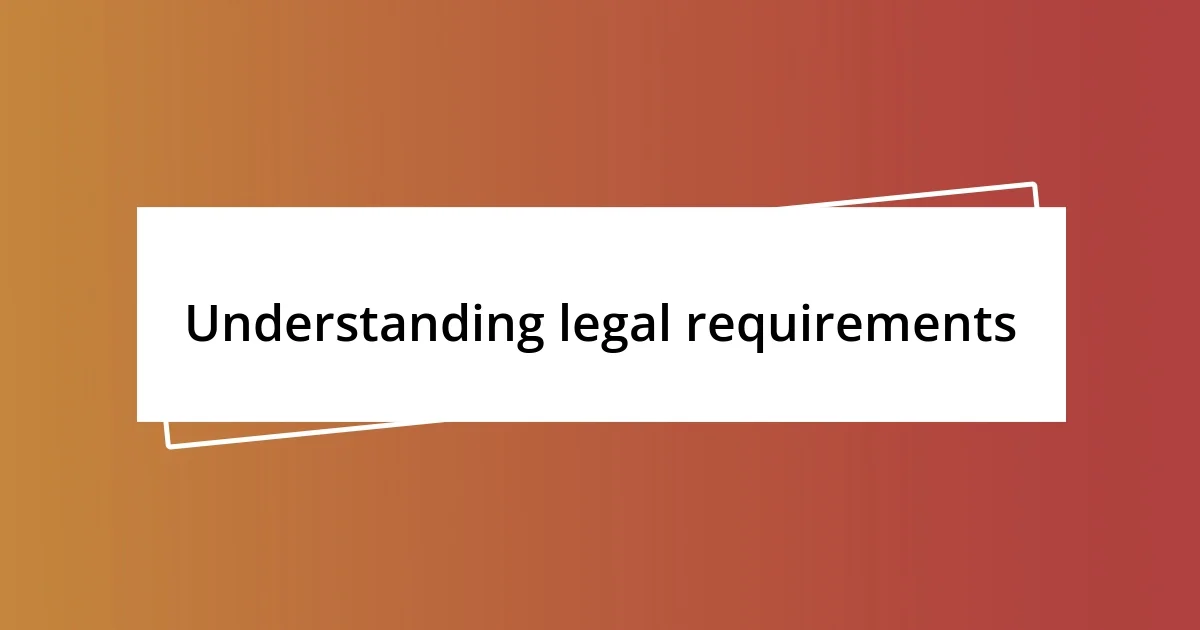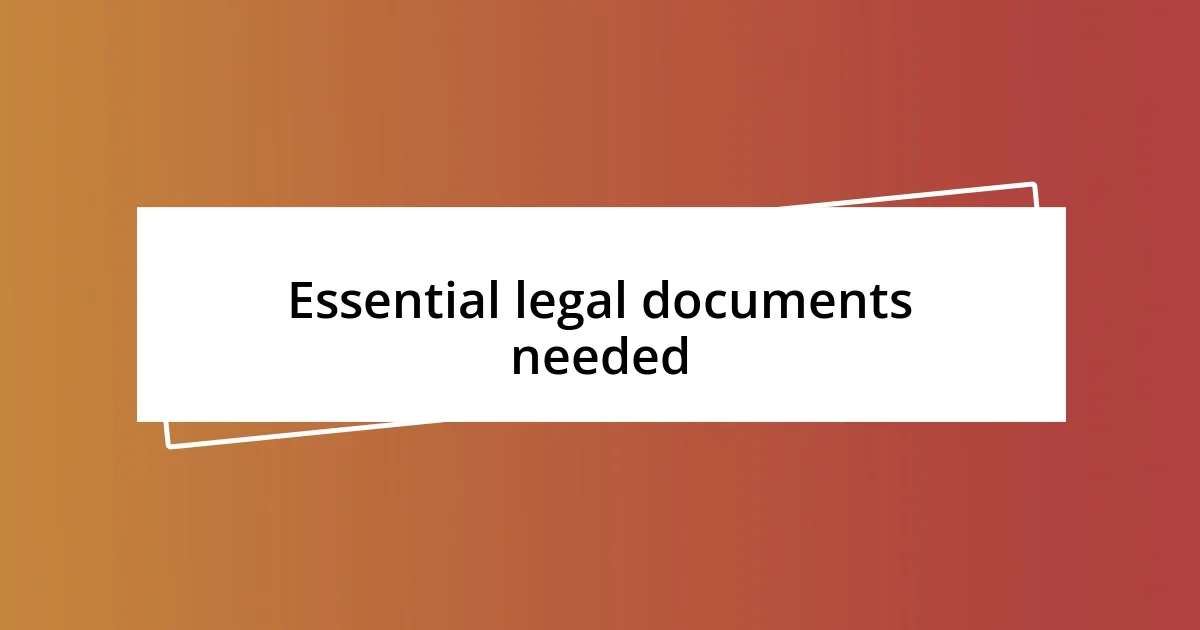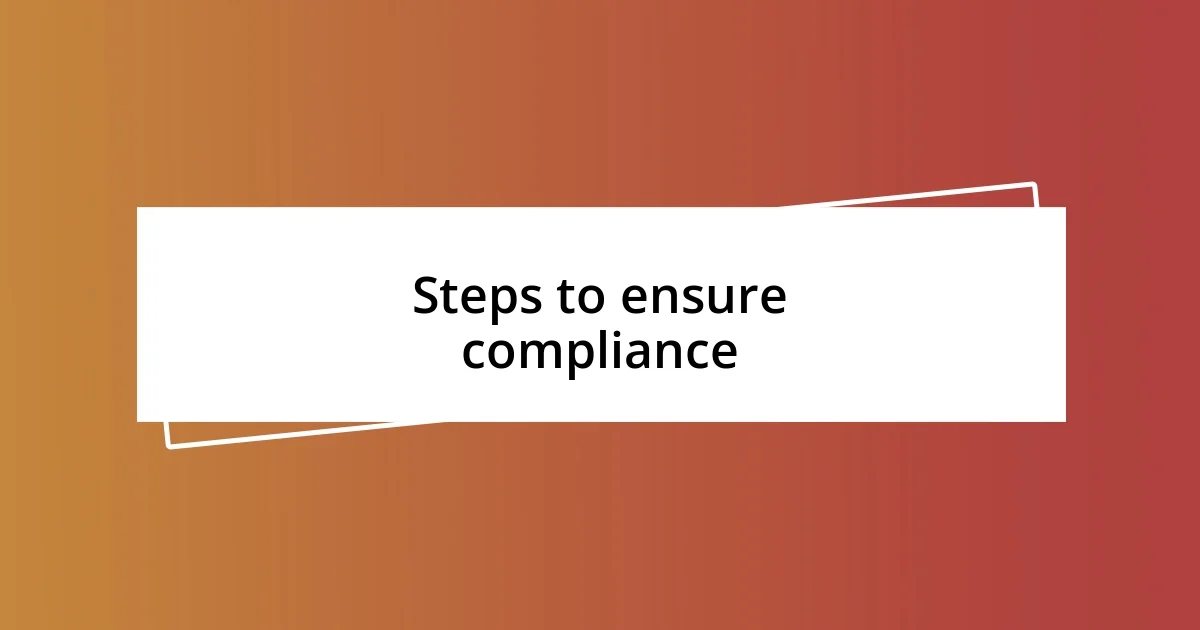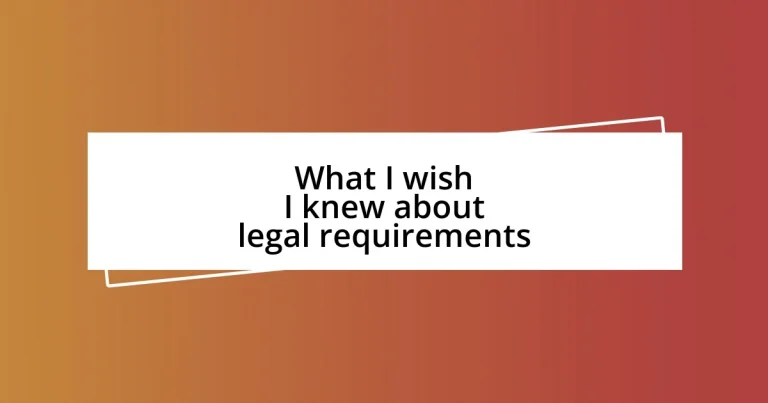Key takeaways:
- Understanding legal requirements is essential for business protection and can prevent costly mistakes; early consultation with a legal expert is beneficial.
- Common misconceptions, such as believing verbal agreements are sufficient, can lead to legal issues; clear written documentation is crucial.
- Regular compliance audits, team training, and staying updated on regulations are vital steps for maintaining compliance and preventing pitfalls in business operations.

Understanding legal requirements
Understanding legal requirements can feel overwhelming, especially when you’re trying to navigate the complexities of regulations. I remember when I first started my business; I was bombarded with a myriad of rules and compliance demands. It felt like trying to find my way through a maze without a map! Has anyone else experienced that confusion?
There’s an undeniable weight that comes with knowing you need to meet legal standards. I was once in a meeting where a minor oversight on documentation almost led to hefty fines. It really drove home the point that even small details matter. This experience made me realize that understanding legal requirements isn’t just about compliance; it’s about protecting what you’ve built.
Thinking about it now, I often ask myself: why do so many people wait until it’s too late to learn about these requirements? The truth is, investing time in understanding these obligations early on can save you from headaches down the line. I wish I had known the value of consulting with a legal expert sooner. It truly pays off to have guidance as you tread these waters.

Common legal misconceptions
Common legal misconceptions can trip up even seasoned business owners. For instance, many believe that a simple verbal agreement is enough to bind parties legally. I once thought this too, until a handshake deal with a vendor fell through, costing me time and money. This taught me that, no matter how trusting the relationship, having things in writing is crucial to safeguard your interests.
Another widespread misconception is that all contracts are created equal. I was surprised to learn that not every contract carries the same weight in court. Understanding the nuances between different contract types—like exclusive vs. non-exclusive agreements—has made a notable difference in how I approach negotiations. It’s essential to recognize that the clarity and intent behind a contract can significantly impact its enforceability.
People often confuse compliance with legality, thinking that as long as they follow the rules, they’re in the clear. I’ve seen businesses meet regulatory demands but still get into legal trouble due to oversight on due diligence. This realization hit home when I had to scramble to address compliance gaps that I had previously overlooked, reminding me that staying informed is a continuous journey.
| Misconception | Reality |
|---|---|
| Verbal Agreements are Binding | Written contracts provide better legal protection |
| All Contracts are Equal | Different contracts have varying levels of enforceability |
| Compliance Equals Legal Safety | Due diligence is essential to avoid legal pitfalls |

Essential legal documents needed
Essential legal documents play a pivotal role in the success and security of any business. I learned this firsthand when I neglected to draft a proper partnership agreement at the start of my entrepreneurial journey. It was only after an unexpected rift with my partner that I realized the significance of having clear, written agreements in place to outline responsibilities and expectations. This experience was a wake-up call for me, underscoring how vital it is to establish the right documents from the get-go.
Here’s a quick rundown of essential legal documents you may need:
- Business License: This is your official permission to operate within your jurisdiction, often dictated by local or state regulations.
- Partnership Agreement: Outlining the terms and conditions of the partnership helps prevent future conflicts.
- Operating Agreement (for LLCs): This document details the management structure of the LLC and defines the roles of members.
- Employment Contracts: Clear contracts protect both employer and employee while outlining duties and compensation.
- Non-Disclosure Agreement (NDA): This protects sensitive information and ensures confidentiality among parties involved.
- Service Agreements: Details the terms of service between a business and a client to ensure both parties are on the same page.
These documents serve as the foundation for your operations and provide clarity and safety in your business relationships. By taking the time to address these essentials, you can avoid unnecessary disputes and protect your hard-earned investments. Each time I’ve revisited them, it’s been a reassuring experience to see clarity in my operations, knowing I’ve done my due diligence.

Key regulations by industry
Navigating key regulations by industry can seem overwhelming, yet it’s essential to understand what applies to your specific field. For instance, when I entered the food industry, I was blindsided by the intricate web of health and safety regulations I needed to comply with. Who knew that something as simple as how ingredients are sourced could have such tight regulations? This discovery not only challenged my operations but tremendously impacted my ability to ensure food safety, which is vital for customer trust.
In the tech sector, data protection regulations can be particularly complex. I remember the anxiety I felt while preparing to launch a software platform; I had to ensure I was compliant with regulations like the General Data Protection Regulation (GDPR). The stakes were high. One small oversight could lead to hefty fines or, worse, a loss of customer trust. Diving into these regulations and understanding concepts like “data subject rights” helped me create a more secure platform, and I learned that proactive compliance is a game-changer.
The construction industry presents its own set of regulatory challenges, particularly concerning safety standards. I had a firsthand lesson when I overlooked some building codes on a project, which resulted in delays and additional costs to rectify the oversight. This experience drove home the importance of familiarizing myself not just with the regulations, but with the rationale behind them. Understanding that these stipulations are in place to protect not only workers but also the integrity of the project can transform how you approach compliance in your business.

Steps to ensure compliance
To ensure compliance, one of the first steps I recommend is conducting a thorough compliance audit. This process involves examining your business operations against applicable regulations. I remember the dread I felt when I realized how much I had overlooked during my first audit. It can be intimidating, but it’s crucial to identify gaps or areas that need attention — think of it as a health check for your business.
Next, don’t underestimate the value of training your team about legal requirements. When I made compliance training a priority, I witnessed a significant shift in the way my staff approached their responsibilities. I noticed they began to ask questions that I hadn’t even considered. This encouraged such an open environment for discussing regulations that it not only enhanced our operations but also strengthened our team dynamics. Have you ever considered how educating your team could prevent compliance issues down the line?
Lastly, it’s vital to stay updated on regulatory changes regularly. I’ve learned the hard way that laws can evolve quickly, and staying informed saves a lot of headaches later. For example, when a new labor law was enacted, I could adapt promptly because I had subscribed to industry newsletters. This proactive approach not only keeps your business compliant but also positions you as a leader in your field. Isn’t it reassuring to know that taking these steps can build a solid foundation for your business’s future?

Seeking professional legal advice
Seeking professional legal advice is one of the smartest decisions I made when navigating the complexities of legal requirements. I remember the weight that lifted off my shoulders after consulting with a lawyer well-versed in my industry. They didn’t just provide me with legal jargon; they broke it down into actionable steps I could actually implement. Have you ever felt overwhelmed by the thought of dealing with regulations on your own? Trust me, having a knowledgeable expert by your side makes all the difference.
It’s easy to underestimate the nuances of legal requirements until they directly impact your business. I recall a moment when I thought I could handle a contract on my own, only to later discover that key clauses had been overlooked. That experience taught me the value of seeking professional guidance; it can save you from costly mistakes. The right legal advice not only protects your business but also empowers you to make informed decisions with confidence.
Establishing a relationship with a legal professional early on can set a strong foundation for your business. I learned that regular check-ins with my attorney helped keep my operations aligned with evolving regulations. It fosters a proactive rather than reactive approach to compliance, relieving stress and allowing me to focus on growth. Have you considered how investing in legal advice could potentially open doors and create new opportunities for your business? I can assure you, the peace of mind that comes from knowing an expert is in your corner is invaluable.

Common pitfalls to avoid
When navigating legal requirements, one common pitfall I’ve witnessed is overlooking the fine print in contracts. I remember being excited about a new partnership, only to discover later that I had missed crucial obligations buried in the legalese. Have you ever found yourself in a similar situation? It’s a stark reminder that due diligence in reviewing agreements can save you from unwanted surprises down the road.
Another significant pitfall is failing to document everything meticulously. In my early days, I thought verbal agreements were sufficient. However, I quickly learned the hard way when misunderstandings arose. Now, I always ensure that conversations turn into written records. This habit not only clarifies expectations but also serves as a valuable reference if disputes ever arise. Can you see how simple documentation can be a safeguard for your interests?
Lastly, I’ve seen many entrepreneurs neglect to set aside time for compliance reviews. I used to get so caught up in day-to-day operations that I forgot to periodically assess our legal standing. I can’t stress enough how vital it is to carve out time for these reviews. Regular check-ins help keep any potential issues at bay and ensure that you’re not caught off guard by regulatory changes. If you’ve ever managed to squeeze in a compliance review, you probably felt a weight lift off your shoulders when you confirmed everything was in order!














